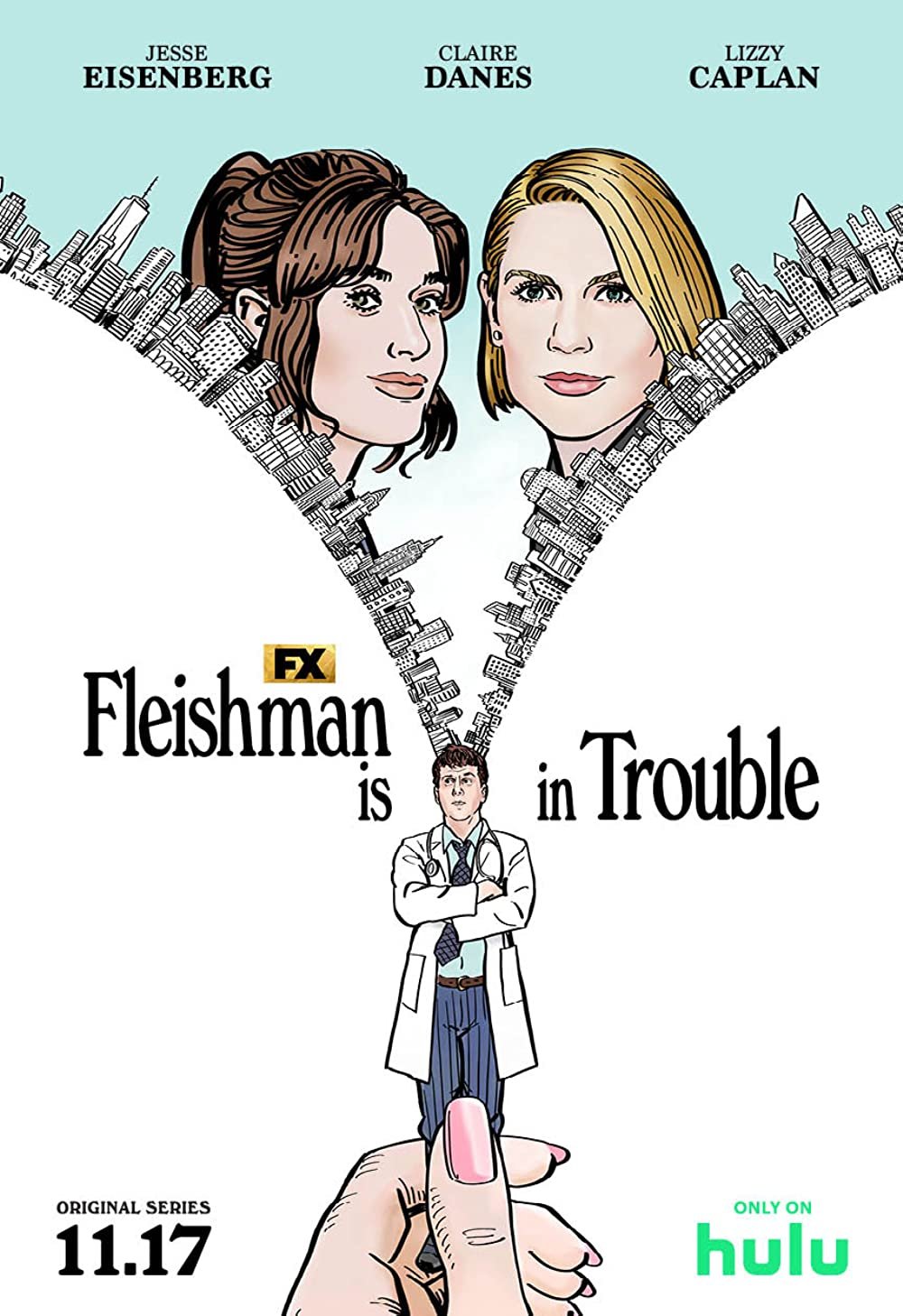“Fleishman is in Trouble” Broke Me
Fleishman is Trouble broke me.
The FX/ Hulu adaptation of Taffy Brodesser-Akner’s novel of the same name was at once the worst and best thing I’ve seen in a long time.
So good in fact, that it compelled me to write again.
Spoilers…
…
…
…
…
…
…
…
…
The show, executive produced by Brodesser-Akner, who also wrote the show (a clarion call for why writers should adapt their own material if ever I’ve heard one) tells the story of Toby Fleishman (Jesse Eisenberg), a successful doctor in NYC who wakes up one morning to find that his ex-wife, Rachel (Claire Danes) has dropped the kids off a day early and then just doesn’t come back.
The show is narrated by Libby (Lizzy Caplan, whom I’ve loved in everything she’s done from Mean Girls to True Blood, to Masters of Sex, to Bachelorette. She is perfection in everything she does and should be cast in everything from henceforth!). Libby is Toby’s friend from their college days, when they, along with Seth (Adam Brody) travelled to Israel on what appears to be a kind of “Birthright” trip together.
Toby calls Libby after not being in-touch for nearly ten years, and the next thing you know, Toby, Libby, and Adam are hanging out in the city, just like old times.
Libby was a moderately successful writer at a men’s magazine. Moderately successful in that she has a full-time job as a writer in NYC. But she wasn’t going anywhere—her career was stalled. She lived in a beautiful single-family home in New Jersey with a really nice husband and a couple of kids, but she seems to feel too like her life has stalled.
And as we watch Libby watching Toby, explaining his choices, telling us his deepest thoughts and hopes and fears, narrating his newly divorced sex-capades, detailing his struggles as a parent, we see a lost woman burying herself in the story of a man. Which is a tale as old as time. If you want to tell a woman’s story, first wrap it in a man’s.
Taffy Brodesser-Akner, a woman, wrote a book called Fleischman in is Trouble and the Fleischman we’re worried about, from the first dizzying shot of the show is Toby, a man—not Rachel, a woman.
It struck me that for all the media out there where women are written (usually pretty badly, see @menwritewomen on Twitter or this reddit thread for endless examples) by men… here we have a novel and it’s TV adaptation written by a woman about a man. But what should have felt in some way “off” to me didn’t… because it was still the voice of Libby (Caplan) that took us from the day of the drop off to the few days later, to the weeks before and after, to the years that were good, to the years before Rachel, to the proposal, to the fights, to the couples therapy sessions, to the fridge full of Beef Lo Mein, and beyond. Something about hearing Libby tell it made me feel, by the third episode, rather tired of Toby and more and more drawn to Libby herself through the flashes of her we saw peeking through her narrations.
Libby worked at a men’s magazine. Her two best friends are men. She doesn’t appear to have any friends in her suburban community, in fact… she seems to shun the moms around her who can’t help but to talk incessantly about their kids… and nothing else. Libby isn’t like them. She’s different. She smokes cigarettes. She stays out late. She’s a… wait… shit. Shit. Shit. Shit. Libby is a “Cool Girl”—or at least thinks she is.
Libby has taught herself… like so many of my fellow elder millennial women to despise women. To think that femininity is some awful thing that we need to run away from and that by being friends with guys and saying things like, “I really don’t get girls” or “I don’t know… I always just liked hanging out with guys more” or “Women are just SO MUCH DRAMA” or “Guys are just more fun” or “I’ve never been a girl’s girl” or “I’ve always just been one of the guys” or… there are many and I could go on… and on… and on… Libby thinks that she’s somehow above the subjects of kids, and families, and grocery shopping, and chores, and permission slips… she’s cooler than all that.
When Libby, in the final episodes tells us the other side of the story—Rachel’s neglected childhood, her ambition, her desire to be loved and included, her traumatic birth experience that was tantamount to assault, her post-partum depression, her passion for her job, her desperate need to be desired… it all starts to make sense. We don’t see Rachel as a villain anymore, but as a woman in the throes of a nervous breakdown, and Libby realizes that burying herself in telling the stories of men erases the women who are just like her but who she thinks are nothing like her.
She falls into the trap of telling only one side of a marriage, just as her idol [misogynist], Archer Sylvan (Christian Slater) did in his once-heralded, now-reviled book.
This show should come with a warning: Might Not Be Suitable For 38-45 Year Old's, Especially If There Are Married, Jewish, Or Live (Or Have Ever Lived) In New York City.
There was so much of my own experiences of late that Libby seemed to embody. She was free once. She was free and beautiful and had her whole life in front of her. Her parents probably told her that she could be anything, that she could do anything. Her Baby-Boomer parents probably thought that feminism was over and unnecessary and that their daughters would be set. Life would be easier for them.
But then us elder millennials watched 9/11 from our dorm room TVs. We graduated college right into the Great Recession of 2008. Then, for many of us, our careers stalled. We couldn’t save money. So yeah, we got Star Bucks and the occasional avocado toast, but with the cost of living increasing and the minimum wage unchanged… what else were we going to do. It wasn’t like home ownership was a real option for most of us to begin with.
Boomers refused to retire, and when they did, many of them planted themselves on their sofas to watch Fox News and started to believe that we were lazy, that we were “entitled,” that we were delicate snowflakes who complained too much and worked too little.
Never mind the fact that in the 1970s the annual cost of a 4-year public college was approximately $550 (about $2500 adjusted for inflation) and when we went to college the cost was about $12,000 ($14,700 adjusted for inflation).
Never mind that the average cost of a home in the 1980s was about $47,000 (about $93,000 adjusted for inflation) and today it’s about $200,000.
Never mind the fact that the federal minimum wage in 1980 was $3.10 and in 2009 it was $7.25.
So yeah, we were told to reach for the stars, and that we could do anything we wanted, by the very same people who years later would break the economy while decrying deficits; who would tell us the world was our oyster, while destroying the planet and ignoring climate change; who would complain about ‘wokeness,’ ‘cancel culture,’ and ‘the PC police,’ while tearing their hair out over drag queen story hours and trans-kids having access to medical care, and found themselves pulling books out of classrooms.
They told us we had every option on earth, and then when they burned them all down, they got angry at us for being “too sensitive.”
Hear me out on this: elder millennials have had a tough go of it. And even if our parents weren’t like that, enough were to make things pretty difficult.
So that was Libby’s story. That’s my story. That is many of our stories. And we were told that we had all the options in the world. But we didn’t. We never did. That was a lie.
And at 41… Libby started to notice that.
As she watches Toby’s relationship explode and sees him going out every night, sleeping with all the women who would have ignored or rejected him in college, Libby starts to question her own marriage. She thinks… “if I left… would I get to be fun again?”
But the thing that got me—the thing that struck me like a ton a bricks was when she says something to the effect of ‘leaving him isn’t going to make me young again’ and then continues “You were not ever gonna be young again. You were only at risk for not remembering that this was as good as it would get in every single moment.” Then we see flashes of life… kids, friends, meals, fights, laughter. And she says “this is the youngest you will ever be. And this. And this. And this…” and it BROKE me.
I was told I could do anything; I could be anything, I could have it all. But that was never true. And in every choice I made, I unwittingly chose not the other thing and now, at almost 40 I can see all the choices I didn’t make, and I wonder… what about the other things? Where did all the choices go? Because, in my head, I’m 28… I’m fun, I’m attractive, I’m a cool girl…but then someone needs help blowing their nose, and someone doesn’t want to do their homework, and I need to cook dinner, and a student needs a letter of recommendation, and I have a tenure file to put together, and the cat needs his pill, and my partner needs me to email a copy of the preschool invoice, and the dog caught another squirrel that needs to be buried, and I have a Zoom meeting to get to, and my friend’s marriages have started to fall apart, and where did my youth go??? When did I become early-middle-aged???
I know that we should all be so lucky as to grow old—to live long enough to become old, and that that is a privilege. Not all people get to grow old. If you’re poor, if you’re a person of color, if you’re a Black or Brown man, if you’re an immigrant, if you’re undocumented, if you are disabled you are less likely to have the privilege of growing old. I know that. But it doesn’t stunt the blow of sitting down to watch a TV show and realizing, in real time, that this is me. These characters aren’t older than me. They are me. They are New York City Jews, with kids, growing and resisting into middle age and that is me and wow… it hurt.
At one particularly dark point in the show, when we’re watching the ongoing dissolution of Toby and Rachel’s marriage, one of my kids got up and came into the living room and asked, “is this a scary show?” and without hesitation we both said a resounding, “YES.” Because while there were no monsters, no serial killers, no creepy villains lurking in the shadows, there was just us… there… growing old and watching the people we are in our heads disappear.
And that, is fucking terrifying.





